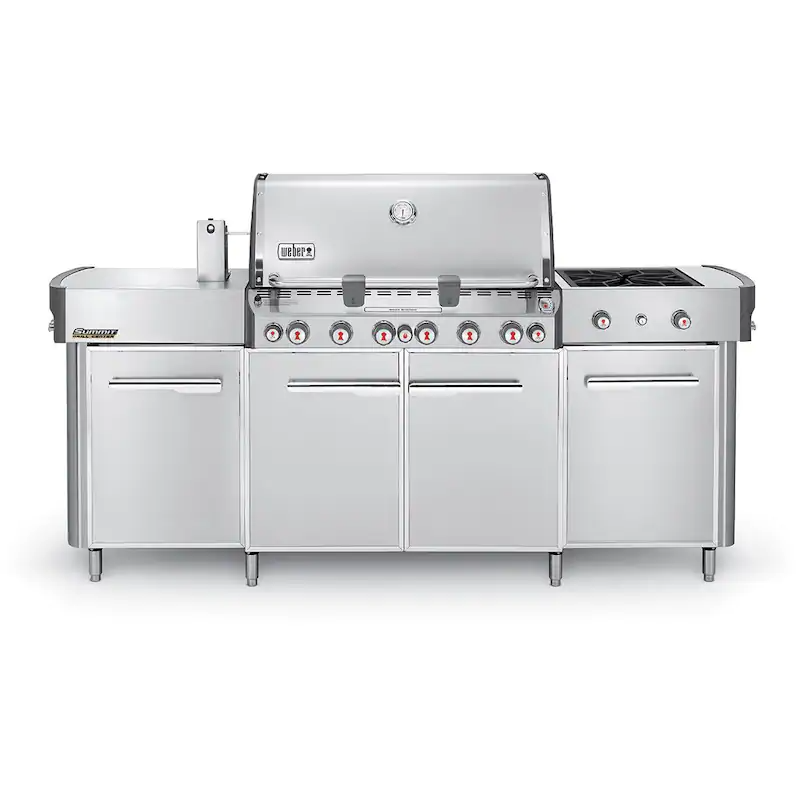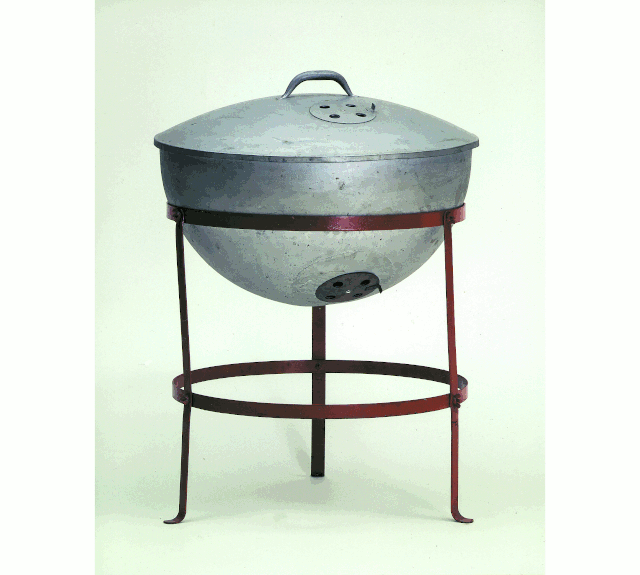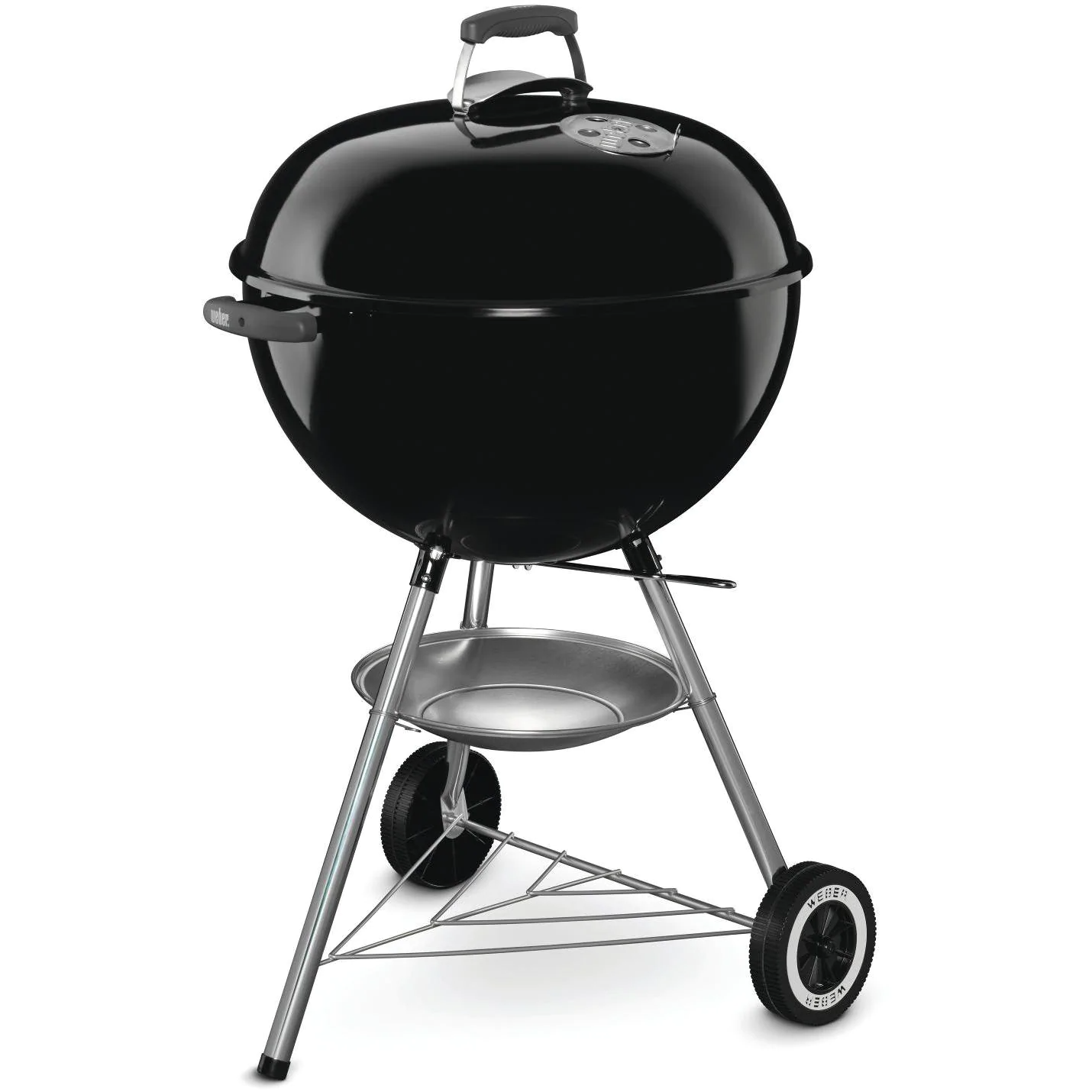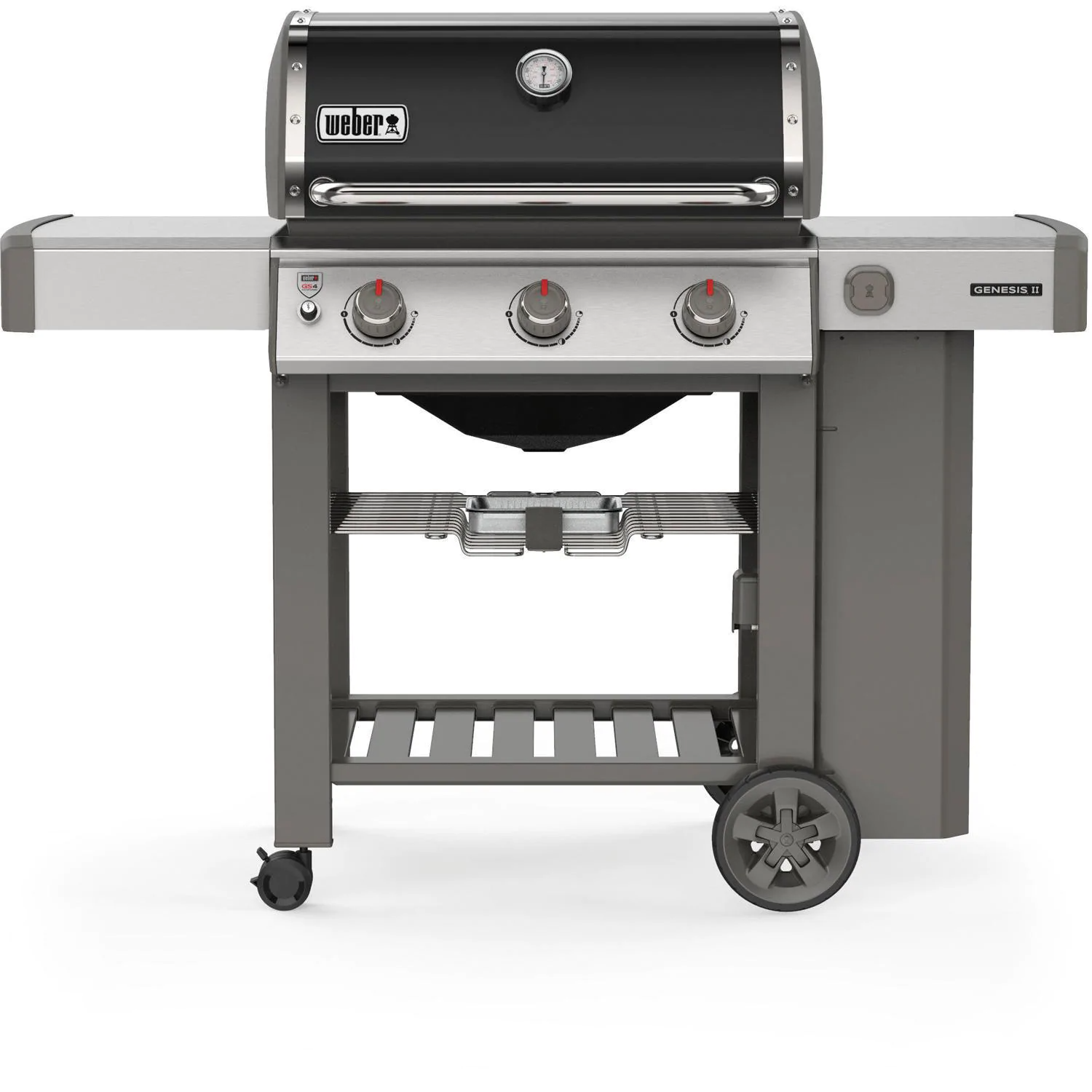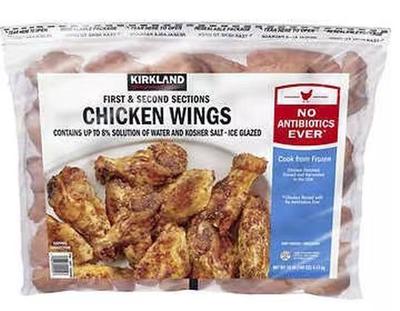How to Buy a Grill
Hello!
Welcome to How to Buy a Grill 101.
In this course, I will give you a brief overview of grills.
Then we will go over the essentials of buying a grill:
- Price: How much does the right grill cost?
- Size: How big does my grill need to be?
- Fuel Types: Should I get a charcoal or gas grill? What are the advantages/disadvantages of each?
- Materials: Will it cook well, and last?
- The Company That Makes it: Does my grill have a warranty? If something goes wrong, will the company make it right?
- Safety: Can I have a grill where I live? Do I know how to use it without burning the house down?
How to Buy a Grill
Overview
Ahhh... the sweet aroma of food cooking over a live-fire grill. Fewer delights in this world are more enjoyable.
Grills were invented to cook food over a hot fire. The first grills didn't even have lids.
A guy named George Stephen took a metal buoy, cut it in half, set it on legs, put a grate inside of it, and made the first Weber kettle grill.
Here's a picture of one of George's original grills from an article about George Stephen written by the Smithsonian Institute.
The lid changed everything because the grill worked better. It cooked foods evenly. Before, without the cover, food would burn because the fire was too hot. And on windy days, ashes got all over your beautiful steaks.
Because of the lid, you have more control over your fire. Thanks, George Stephen.
Now grills come in all shapes, sizes, and prices. Oh my!
Which one should you buy?
Before you plop down your hard-earned cash, read this Consumer Awareness Guide about How to Buy a Grill.
The first item on our list on how to buy a grill...
Price: How Much Does the Right Grill Cost?
Part of knowing how to buy a grill is being aware of how much grills cost.
Like anything else you buy, you need to come up with a price or price range before doing so.
You need to do some research, that's why you're reading this Consumer Awareness Guide about How to Buy a Grill.
Great job!
The information below will give you some idea of how much grills cost.
Charcoal grills cost less than gas grills because there's less to them. There are no gas tubes, burners, knobs, etc...
This original Weber kettle grill costs a little over a hundred bucks! Pretty good for such a nice grill.
By contrast, this Weber Genesis gas grill is about $750.00.
And the prices go up from there. That's why it's essential to get a quality grill that'll last you years to come.
We'll cover this in more detail when we talk about materials and the company that makes your grill.
Next on our list about learning how to buy a grill, is...
Size: How Big Does My Grill Need to be?
Yes, size does matter. And when it comes to grilling, the bigger, the better.
Bigger grills take longer to heat up and use more fuel, but you can cook more food with them.
The size of your grill depends on what you want or like to cook. And the number of people you're cooking for.
If you want to cook an entire meal on the grill, you need to have enough space as the average dinner plate per person. That's about 104 square inches per person.
That's using the direct heat cooking method. If you want to cook indirectly, you'll need twice as much room.
For instance, if you want to cook bone-in chicken pieces, they need to be cooked by the indirect method for most of the cooking time. This means you put the chicken on the cooking grate, but not directly over the fire, or the chicken will burn.
You need room to put the chicken on the grill and space for the coals or lit burners next to the chicken.
This also applies to larges cuts like whole birds, chickens, turkeys, ducks, game hens, etc... As well as large whole fish and roasts.
Generally, if what you're cooking takes 25 minutes or less, use the direct method. If it takes longer than 25 minutes to cook, use the indirect method.
When looking at grills, the specs will give you the total cooking surface area. This includes the warming rack. Look for the size of the main grilling area. You can't cook on a warming rack.
If you want to cook turkeys, (and trust me, you do), make sure the lid is high enough. You want at least 12" from the cooking rack to the inside of the cover.
Next, on how to buy a grill, you want to consider...
Fuel Types: Should I Get a Charcoal or Gas Grill? What are the Advantages/Disadvantages of Each?
Grills use different types of fuel. This affects the flavor of the food being cooked.
We'll be talking about charcoal and gas grills. Not electric or pellet grills.
If you want your food to taste like it was cooked over a live fire, you want a charcoal grill.
Charcoal imparts a smoky flavor to your food, natural gas, and propane do not.
You can add wood chunks or chips to a gas grill, but it's not the same. It's still pretty good, though. Some gas grills do have the choice of adding charcoal to achieve that smoky flavor.
Now, if you want a grill that doesn't have a smoky flavor, you want a gas grill.
Let's go over some advantages and disadvantages of each:
- Gas grills are more comfortable to use. They heat up quicker, and the heat is easier to control because of the knobs.
- Charcoal grills cook much hotter than gas grills without an infrared burner.
- Gas grills can be dangerous to light or relight. The gas may pool in the bottom of the grill and cause an explosion. They don't seal well for this reason. This allows a lot of heat and smoke to escape. More on this in the safety section...
- Charcoal grills can be dangerous because of the hot embers that the wind blows around. In some places, they're banned, like balconies, apartments, and other multi-unit properties.
- Gas grills are easier to clean and produce less of a mess.
- Charcoal is messy and produces ash that must be removed.
- For long cooks, you need to add charcoal to keep the fire going.
- You can get side burners and rotisseries for gas grills. You can get rotisseries for charcoal grills, but not side burners. If you want a side burner and a charcoal grill, you can always get a portable burner.
- Rotisseries have to be plugged in. Keep that in mind if you want to take your grill camping or on the road. Grills that use natural gas can't be moved.
- Gas grills have more parts than charcoal grills. This makes them more expensive to buy, keep up and repair.
- You'll probably go to the store more for charcoal than propane.
- For charcoal, you also need a way to light it. Chimney starter, starter cubes, paper, etc...
My favorite way to light charcoal is with a torch: No paper, starter cubes, or even a chimney starter. Use the torch to light the charcoal in a couple of spots and that's it.
Bottom line?
If a smoky, grilled flavor is most important to you, get a charcoal grill.
If convenience and ease of use is your top priority, get a gas grill.
Or get both.
Sometimes you want to be a caveman and light a fire, and sometimes, you just wanna relax and eat.
Now, an essential topic on how to buy a grill...
Materials: Will it cook well, and last?
Buying a quality grill is crucial. If you do it right, you'll enjoy your new grill for many years to come. I still use a Weber Genesis Gold gas grill that I bought in 2002!
If you do it wrong, you'll be buying a new grill in a few short seasons.
Knowing how to buy a grill is not hard if you know what to look for.
What makes a quality grill? The materials used to build the grill is a big part of it.
Here's what you need to know:
- The materials used to make quality grills are steel, stainless steel, or cast aluminum.
- Steel holds and conducts heat better than aluminum. Thicker steel retains heat better than thinner steel.
- Grills should be enamel or powder coated, not painted. The paint will chip, peel, and bubble. I know this from personal experience. Don't buy a cheap grill at the grocery store!
- If you're buying a gas grill, the burners should be stainless steel or brass. And there should be more than one. At least three or more burners are best for indirect cooking and to have a safe zone to keep food from burning.
- Stainless steel grates are my favorite material for grates. They're easy to clean and last a long time. Some people love cast iron, but these will rust. You can always find replacement grates if you don't like the grates your grill comes with.
- Rotisseries kits are nice to have and produce fantastic food. If your grill doesn't come with one, make sure you can fit one to it. Most manufacturers make a rotisserie kit for their grills. Most gas grills can accommodate a rotisserie. Weber charcoal grills have a rotisserie kit available.
- For charcoal grills, make sure there's an easy way to remove the ashes.
- If your grill has wheels, are they sturdy? Will they roll across your lawn or the rocks on the side of the house? Can you move the grill with ease? If there are four wheels, do they lock?
- Wooden handles and side tables will crack and rot. Choose heavy nylon or steel shelves. Nylon and steel handles are the best.
- While not a necessity, a table attached to your grill is nice to have. It gives you a place to put your food while you take off the grill's lid, clean the grate, etc...
- Make sure your grill has a lid. Some grills don't believe it or not.
You can't talk about how to buy a grill without considering...
The Company That Makes My Grill: Does my Grill Have a Warranty? If Something Goes Wrong, Will the Company Make it Right?
It amazes me that I have to tell people this, but make sure your grill has a warranty.
Every reputable grill manufacturer has a warranty on their grills. Buy a grill from a good company that gives you a guarantee.
Some manufacturers will give you a warranty on the whole grill;
The Weber Genesis II E-310 Propane Gas Grill has a 10-year warranty!
Some manufacturers have different warranties for different parts of the grill;
The Weber Original Kettle 22-Inch Charcoal Grill has a 10-year warranty on the bowl and the lid, a 5-year warranty on the ash cleaning system, and a 2-year warranty on all the remaining parts.
What if something goes wrong? Will, the company make it right?
This comes down to reputation. Read reviews about the companies before you spend your money. Check out what other customers say about their products and service.
- Have you heard of the company before? Has anybody else?
- Are they nice?
- Are they helpful?
- Can you talk to a live person?
- Do they have parts to keep up and repair your grill?
I have a Weber Genesis Gold that I bought in 2002. I fixed it up with new burners, igniter, and heat shields that I got from my local hardware store! All the parts were genuine Weber parts.
Good grills last awhile. It's nice to be able to repair instead of replacing them.
I would never recommend anything to you unless I was confident you would be pleased with it.
I can tell you that Weber and CampChef are two companies that have great products and outstanding customer service from personal experience.
Both companies also make great accessories for all their products.
Our last, but most important topic on how to buy a grill...
Safety: Can I Have a Grill Where I Live? Do I Know How to use it Without Burning the House Down?
Did you know, between 2014-2018, grills, hibachis, and barbecues were involved in an average of 10,600 home fires per year?
These fires caused 10 deaths a year, 160 injuries, and 149 million dollars in property damage!
This is according to a report by NFPA.org. The National Fire Protection Agency.
I want you to enjoy a nice day outside grilling up something delicious.
But...
I also want you to be safe, so we're going to talk about keeping you, your family, and your property safe right now.
Safety is essential when it comes to knowing how to buy a grill.
If you place your charcoal grill in a yard full of dead grass and leaves, the embers falling out of the grill's bottom may blow onto the grass and start a fire. Same with a wooden deck.
Grease coming out of a gas grill can also cause a fire.
- Never place your grill on or near anything that can catch on fire!
- Make sure your grill is 10 feet away from any combustible structure. That means your house, work shed, barn, etc...
- Do not use grills on combustible balconies or wooden decks. Some states will allow grills on balconies if they have an automatic sprinkler system in the building and on the balconies and patios.
- Use caution when using charcoal grills on windy days. The wind can blow the embers around and start a fire. This is even more dangerous when grilling on an upstairs balcony.
- Never store propane tanks in your house or garage. If you need to move your gas grill inside for storage, remove the tank and leave it outside.
Check with local ordinances to see if you can even have a grill. In some places, they're banned!
If you live in a house, most of the time you won't have a problem. Nobody's gonna come over and inspect your grills. You still need to be safe, though.
No, it's if you live in a multi-unit property like an apartment or condo. Some Homeowner Associations and landlords restrict certain grills as well.
It's illegal in most states to use an open fire grill within 10 feet of a combustible building. Also, all fuel must be stored 15 feet away from any structure. This makes it difficult to grill in an apartment or some condos; you can't get 10-15 feet away from your building and still be on your property!
Most states allow you to use the 2-1/2lb propane tanks used for camp stoves and portable gas grills in apartment complexes. Again, check with state, local ordinances, and your landlord if you rent.
Another safety item you need to know about is lighting and relighting propane and natural gas grills.
Gas grills are leaky. This is to prevent gas from building up in the grill's bottom and causing an explosion when lit. Because of this, on windy days, the fire can get blown out. If this happens, Do Not Relight Your Grill Right Away! If you try to relight your grill, the gas that may have accumulated in the grill's bottom may explode. This happened to someone I know, and it happens to a lot of other people as well.
Open the lid to the grill and air it out for 3-5 minutes, then turn on the gas and try to relight it. If the igniter isn't working, use a long match or light a wooden skewer on fire.
Also, if you try to light your gas grill and it won't light, You want to do the same thing as above; Let the grill air out for 3-5 minutes, then turn on the gas and try to relight it. (The lid should already be up if your lighting your grill.) If the igniter isn't working, use a long match or light a wooden skewer on fire.
People think that propane tanks cause explosions, but that's not true. The propane tanks are heavy and can contain the fuel well. It's the leaks in your grill that cause the problem.
The gas that leaks from the hoses in your grill ignites. The valve to the propane tank is open, causing the fuel inside to combust and cause an explosion.
To check for leaks, spray the hoses and their connections down with soapy water. If you see any bubbles, you have a leak. Replace the leaky parts before you do any grilling.
One last safety tip. This is more about using a grill than about how to buy a grill, but I thought I should mention it.
If you go out to grill in winter, and your grill's lid is covered in snow or ice, remove this before lighting your grill. Sometimes you'll lift the lid to your gas grill, and the snow stays on it. Then you light your grill and put the top down.
Then the snow melts around your grill and then freezes again. Now you come out and step on the ice slick, break a hip, and the barbecue's over.
Not good!
Remove the snow from your grill lid before lighting your grill.
Some items about budgeting you want to be aware of so you don't have any unpleasant surprises:
- If your grill is exposed to the elements, you should get a cover for it. It'll last longer and look better. And snow won't get stuck on the lid!
- If this is your first grill, you may need some grilling tools; Long handle tongs, spatula, grill scraper, etc... For more about tools, see my tools page.
- If you decide on a propane grill, I recommend you get an extra tank and keep it filled. That way, you'll never run out of fuel in the middle of your cook.
- If you like smoky foods, plan on buying some wood chips or chunks.
- Some grills are setup for propane and some for natural gas. Others you have to covert. If you want to convert your propane grill to natural gas, or vice versa, make sure the conversion kit you use doesn't void your warranty. Check with your grill manufacturer.
I hope you've found this course on How to Buy a Grill useful. Now you know how to buy a grill!
If you have any comments or questions about buying a grill, or anything else, you can use the form below or contact me here.
Have A Question or Comment About This Topic?
Do you have a question or comment about this? Share it!
